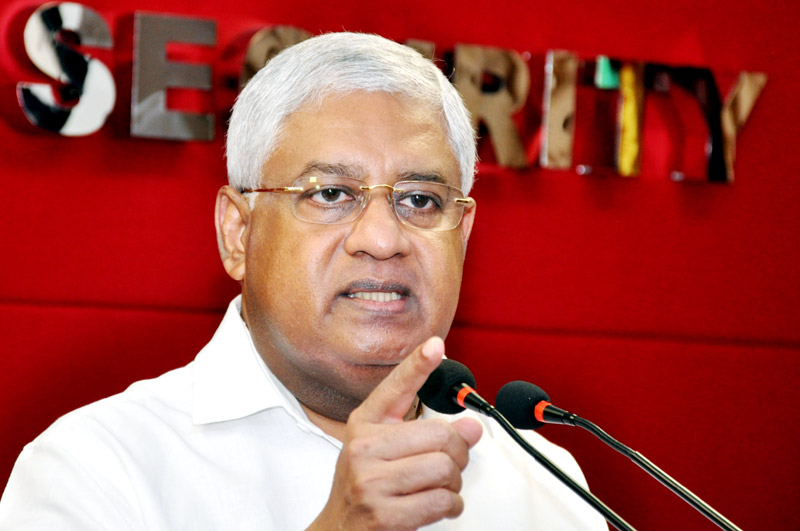Thursday Apr 10, 2025
Thursday Apr 10, 2025
Tuesday, 7 May 2024 00:00 - - {{hitsCtrl.values.hits}}

– Pic by Lasantha Kumara
By Charumini de Silva
Public Security Minister Tiran Alles yesterday stood firm in defence of the Government’s move to transition to outsourcing of visa processing system and increase visa fees, amidst widespread criticism.
Speaking at a special media briefing, he justified the changes, citing feedback from tourists and the need for an improved visa issuance system. The Minister outlined the decision-making process behind the visa changes, highlighting the thorough review conducted by a Cabinet-appointed committee, which sought recommendations from the Attorney General and obtained unanimous approval from the House without debate.
“The changes were prompted by complaints from tourists and addressing long-standing issues with the previous Electronic Travel Authorisation (ETA) system which were directed to President Ranil Wickremesinghe during his engagements with the tourists themselves,” he explained.
“We received numerous complaints from tourists who fell victim to rouge websites charging exorbitant rates of $80-90 for visas similar to the previously operated ETA system. Eventually, these visitors not only lost their money but also did not receive the promised visas,” he said.
Acknowledging concerns about the lack of tender procedures, Minister Alles explained that the Government often opts for proposal studies for various projects, bypassing the tender processes.
Minister Alles categorically denied any involvement of an Indian company in the visa processing regime, dispelling speculations.
He underscored the limitations of the previous ETA system, noting its inability to process essential documents and photographs, despite being given four years to upgrade.
“If you have a company and are developing a platform which you have already developed, a local economic crisis must not be a problem,” he responded, when asked why the local firm which provided the ETA system previously was not given a chance to improve the system.
The Minister defended the selection of VFS, citing its global positioning, technological capabilities and zero costs to the Government.
“At the time we wanted to revamp the system, VFS was the best opportunity we had,” he said, adding that 17 new visa categories were introduced including double entry six months visa, digital nomad visas and 10 year long term non-resident visa categories.
He revealed that the Government entered into a 12-year agreement with VFS, which invested $ 200 million in the necessary software and equipment. “The transition to VFS has resulted in significant cost savings for the Government, eliminating the Rs. 1 million to 1.5 million previously paid monthly to the local ETA system provider (SLT-Mobitel),” he added. Previously, the Government covered the expenses for maintenance and license fees (Oracle database and SSL certificate — a digital certificate that encrypts online communication), with the maintenance fee including a call centre fee of Rs. 20 per minute for inquiries.
Reiterating the advantages of selecting VFS as the service provider, the Minister affirmed that there are no inherent disadvantages to Sri Lanka or its citizens. “Under the new visa processing system all expenses are borne by visa applicants — international visitors,” he said.
Minister Alles further reinforced the rationale behind selecting VFS highlighting the prevailing international norms regarding visa fees. “It is customary for citizens of any country, including Sri Lanka, to pay a fee for VFS in obtaining visas to travel abroad. If a Sri Lankan citizen intends to travel to France, Germany, Hungary, Italy, or Spain, they must pay a fee of $ 21. For a visit to Malaysia, the fee is $ 73, Croatia $ 30, Latvia $ 42, Georgia $ 37, UAE $ 25 and New Zealand $ 30. These rates are just the base fees and may include additional costs. Interestingly, I discovered that Sri Lankan citizens are required to pay varying, yet a higher visa fee than what we charge from foreign citizens to enter our country,” he said.
Contrary to the outcry over the $ 18.50 fee charged by VFS, the Minister underscored the comparative affordability of Sri Lanka’s visa processing fees. “It is regrettable that some individuals are expressing discontent over the $ 18.50 fee imposed on foreigners, when in fact, it remains competitive in comparison to fees charged by other countries,” he remarked.
The Minister acknowledged the visa fee increase amounts to$ 25, but for the six-month, double-entry visa priced at $ 75.
“The failure to include the single-entry 30-day visa in the past 20 days (from 17 April - 6 May 2024) might have resulted in extra expenses for tourists,” he admitted.
He affirmed the Government’s assurance to ensure a seamless and efficient visa processing system that aligns with international standards while serving the best interests of all stakeholders.
